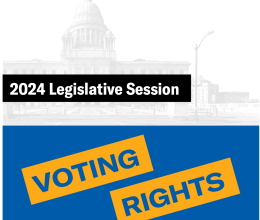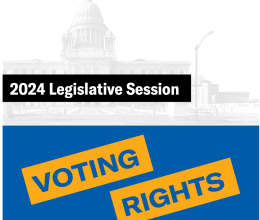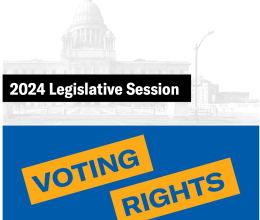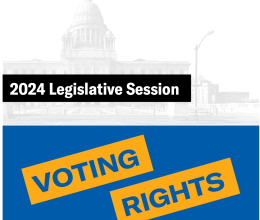The ACLU has filed a “friend of the court” brief in the U.S. Court of Appeals in Boston, challenging the state’s attempt to overturn a recent decision from a panel of that court which held that the Urban League of R.I., the NAACP and other plaintiffs have the right to pursue a claim that black voting power on the South Side of Providence was improperly diluted by recently redrawn Senate district lines. The federal panel’s favorable ruling is being reheard by the entire appellate court on February 4th.
Last October, the court panel reversed a lower court’s holding that a racial group which claims the ability to “influence the election” of candidates but whose members constitute less than a majority of the population in a proposed voting district cannot maintain an action under the federal Voting Rights Act. In a 2-1 vote, the court agreed with arguments made by the plaintiffs and the ACLU in an earlier “friend of the court” brief that the historic Act was designed to address not only redistricting plans where racial minorities are deprived of the ability to constitute a voting majority in a district, but also plans that deny smaller groups of minorities the possibility of electing the candidate of their choice with the assistance of cross-over votes.
In its latest brief to the full court, the ACLU buttresses its arguments with an analysis of the legislative history of the Voting Rights Act and court cases examining vote dilution claims over the decades. The brief was filed by Neil Bradley from the ACLU’s Southern Regional Office in Atlanta, which has been involved for decades in pursuing litigation under the Act.
In challenging the state’s position, the brief states: “There is no theory consistent with the development of vote dilution law and the reality of how vote dilution operates that would justify barring claims brought by minorities who can achieve the standard of ability to elect only with the benefit of some crossover votes. [The Act] is designed to reduce the effectiveness of majority bloc voting along racial lines, and that is exactly what the remedy sought here is designed to do.”
The brief concludes: “The state’s argument that drawing a minority-minority district would not be protecting the minority but rather protecting a political coalition misunderstands [the Act] on several levels. When majority white districts are the dilutive device, the way [the Act] functions is to reduce the effectiveness of a majority bloc vote. The remedy seeks to prevent minority supported candidates from automatically losing because of race. Whether the remedy provides equal access to the minority via a district that requires the minority to secure some crossover votes or none has no bearing on whether Section 2 should apply. In either case, the ability of the white majority voting as a bloc to usually defeat the minority's preferred candidates is disabled.”




